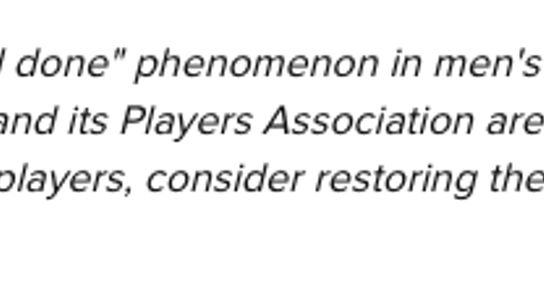Freshmen have been eligible in college football and basketball since 1972 - longer than the lifetime of many of you reading this. For most of that time, there hasn't been an issue with this rule. But now, with the NCAA's model under attack from all angles, three Power Five conferences have offered opinions that maybe, possibly they'd like to talk about talking about making freshmen ineligible again.
"I've had conversations with several commissioners about [freshman ineligibility]," Pac-12 commissioner Larry Scott told CBSSports. "We are pushing, and I think you will see much more serious conversations about it in the coming months and year."
Two of those commissioners Scott has discussed the issue with, apparently, are the ACC's John Swofford and the Big 12's Bob Bowslby. "I don't think it's looked upon as radical an idea as it seemed to people five years or 10 years ago because it makes so much sense educationally," Swofford said. "We're in a period now where everybody is trying to get a hold of the student-athlete experience and a recommitment, if you will, to balance academics and athletics."
Added Bowlsby: "I think there's a growing interest in a robust debate, and I think we ought to drag it to the ground and consider it any way we can. I think it is the one change that could make an absolutely dramatic difference in college athletics."
On top of that, the Big Ten plans to gather its leadership to discuss the issue as a group according to University of Maryland campus paper The Diamondback. “What I like about the concept of the proposal is it puts right up front the basic issue: Are we basically a quasi-professional activity or primarily an educational activity?” Maryland president President Wallace Loh told the paper. “And if you support it, you are basically saying very clearly the No. 1 priority is the education of the students.”
The timing of these discussions is curious at best and disingenuous at worst. The NCAA's hallowed amateurism model has been under serious attack through lawsuits filed by former UCLA basketball player Ed O'Bannon and antitrust lawyer Jeffrey Kessler. Northwestern football players appealed for the right to unionize less than a year ago. The door has felt the force of the battering ram, and it isn't going to hold.
Cost of attendance scholarships are on the way to reality, but many don't view that as enough of a concession from an industry that rakes in billions a year. Regardless of where you fall on the issue, public support has undeniably never been stronger in favor of athletes.
So are these new discussions of reviving an old rule in the genuine best interest of college athletes or a stand-your-ground issue from management? Let's look at the issue again. Scott's conference, as CBS's Jon Solmon points out, arose the issue as a point of retaliation against the NBA's one-and-done rule.

Maryland president Loh basically admits as much. “What I like about the concept of the proposal is it puts right up front the basic issue: Are we basically a quasi-professional activity or primarily an educational activity?”
And who can forget Big Ten commissioner Jim Delany's famous bluff that his conference would drop down to Division III before partaking in a "pay-for-play" model?
Considering the NCAA's illustrious history of placing its model ahead of the interests of those it purportedly serves, it's worth examining: Would freshmen ineligibility actually benefit college freshmen? Is it even the best idea on the table?
Maybe, and no.
Ineligibility would benefit some freshmen and hurt others. The past 40-plus years have shown large numbers of freshmen that are ready for college from the day they step on campus, and a large number that aren't ready at all. Many of those freshmen aren't ready for college as sophomores, juniors or seniors, either. Why hinder those who hit college in a dead sprint because their peers may not be up to speed?
To answer the latter question, Mississippi State athletics director Scott Stricklin offered a better idea than mandating all freshmen take a redshirt season - eliminate redshirts entirely, either permanently or on a merit basis.
Stricklin isn't the originator of this idea. Terry Bowden (of all people) wrote a column nearly a decade ago arguing for a fifth year of eligibility. "Most coaches will tell you that when a student-athlete is held out for an entire season," Bowden wrote, "he loses interest in being part of the team and subsequently loses interest in his school work as well."
Mack Brown also raised the issue of a fifth year of eligibility during his year as president of the American Football Coaches Association. "We’ve found the ones that play have better grades than the ones that don’t because they’re involved," he said in 2013. "Redshirting is really, really hard on a lot of kids." Like anything else in football, those coaches assuredly stole that idea from someone else who'd stolen it from someone else, too.
It's possible the sting of redshirting would be less painful if an entire freshman class was automatically redshirted instead of just those deemed as not ready to play. But such a drastic rule would need a thorough examination and re-examination of whose interests are being served.
If it's purely as a reaction to the NBA's one-and-done rule - which, keep in mind, only pulled a pebble-drop-in-the-ocean 11 freshmen out of college basketball in 2014 - or as a defense mechanism against O'Bannon and Kessler, it is most definitely not in the best in the interests of the 18-year-olds.
Which, come to think of it, kind of explains why commissioners and presidents are so enamored with this rule in the first place.
